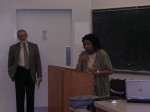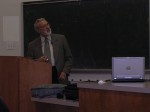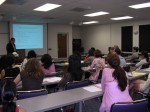Ethnic Identity among Immigrant Youth: A Cross National Perspective
Jean Phinney, Ph.D.
Professor of Psychology, California State University Los Angeles
Thursday, October 27th 2005
12:15 – 1:30pm
3534 Franz Hall
University of California, Los Angeles
Los Angeles, CA 90095-1563
PLEASE CLICK HERE TO WATCH DR. PHINNEY’S PRESENTATION
Click here to read Dr. Phinney’s Paper
PROGRAM
12:15-1:30 pm Lunch/Talk/Q & A
ABOUT THE TALK
Scholars interested in ethnic identity acknowledge that the context is an important influence on its development and expression. However, most of the psychological research on ethnic identity has been carried out in the United States and has not examined context specifically. In this presentation, Dr. Phinney will discuss results from an international study of over 5000 immigrant youth who were surveyed in 13 immigrant-receiving countries. The study explored the relationship of ethnic identity to national identity and to acculturation, the role of ethnic identity in psychological adaptation, variation in individual profiles of identity, and similarities and differences across countries and ethnic groups. The results suggest four different profiles of cultural identity, including bicultural, ethnic, national, and diffuse. These profiles vary in their relationship to adaptation and in their distribution across contexts. Ethnic identity among immigrant youth can best be understood in terms of complex interactions among the attitudes and characteristics of immigrants and the contexts in which they live.
ABOUT DR. JEAN PHINNEY
Is a Professor of Psychology at California State University, Los Angeles. She received her B.A. from Wellesley College and her Ph.D. from UCLA. For the past twenty years she has been studying ethnic identity, acculturation, and psychological well-being among adolescents and emerging adults from diverse ethnic and immigrant groups in southern California. She is the author of the widely used Multigroup Ethnic Identity Measure. She has published extensively on ethnic identity, as well as on bicultural and biracial identity. She is part of an international team that recently completed a study (and forthcoming book) on adaptation of immigrant adolescents in thirteen countries. She is currently conducting research on academic success of ethnic minority first-generation college students.
ABOUT UCLA CRETSCMHD
A diverse group of faculty, health professionals, community-based agencies, and minority media have joined together though CRETSCMHD to effectively reduce or eliminate disparities in health among racial and ethnic minorities. As part of the Center’s mission CRETSCMHD will be offering a series of educational lecture for UCLA faculty, local health care providers and organizations focused on service delivering and health planning. these sessions focus on the elimination of health disparities in the areas of cancer, diabetes, and coronary heart disease.
Center Director:
Vickie M. Mays, Ph.D., MSPH, Professor, UCLA Department of Psychology & Department of Health Services, School of Public Health
Associate Directors:
Marjorie Kagawa-Singer, Ph.D., MN, RN Assoc. Professor, UCLA School of Public Health, Community Health Sciences & Asian American Studies Interdepartmental Degree Program
Paul Ong, Ph.D. Professor, UCLA School of Public Policy and Social Research. Director, UCLA Lewis Center for Regional Policy Studies
Abel Valenzuela, Ph.D.
Assoc. Professor, UCLA Department of Urban Planning & Chicano Studies, Director, UCLA Center of the Study of Urban Poverty
LOCATION & PARKING
Stop at any of the UCLA parking kiosks to purchase a parking permit for structure #2. Attendants will be on duty to collect $7 and direct you to structure #2
ABOUT THE LECTURE
This lecture is presented by the UCLA Psychology Department’s Weekly Developmental Forum, in association with the UCLA Center for Research, Education, Training, and Strategic Communication on Minority Health Disparities (CRETSCMHD).
 Sergio Aguilar-Gaxiola, MD, Ph.D.
Sergio Aguilar-Gaxiola, MD, Ph.D.

 Matthew Snipp,
Matthew Snipp, 
